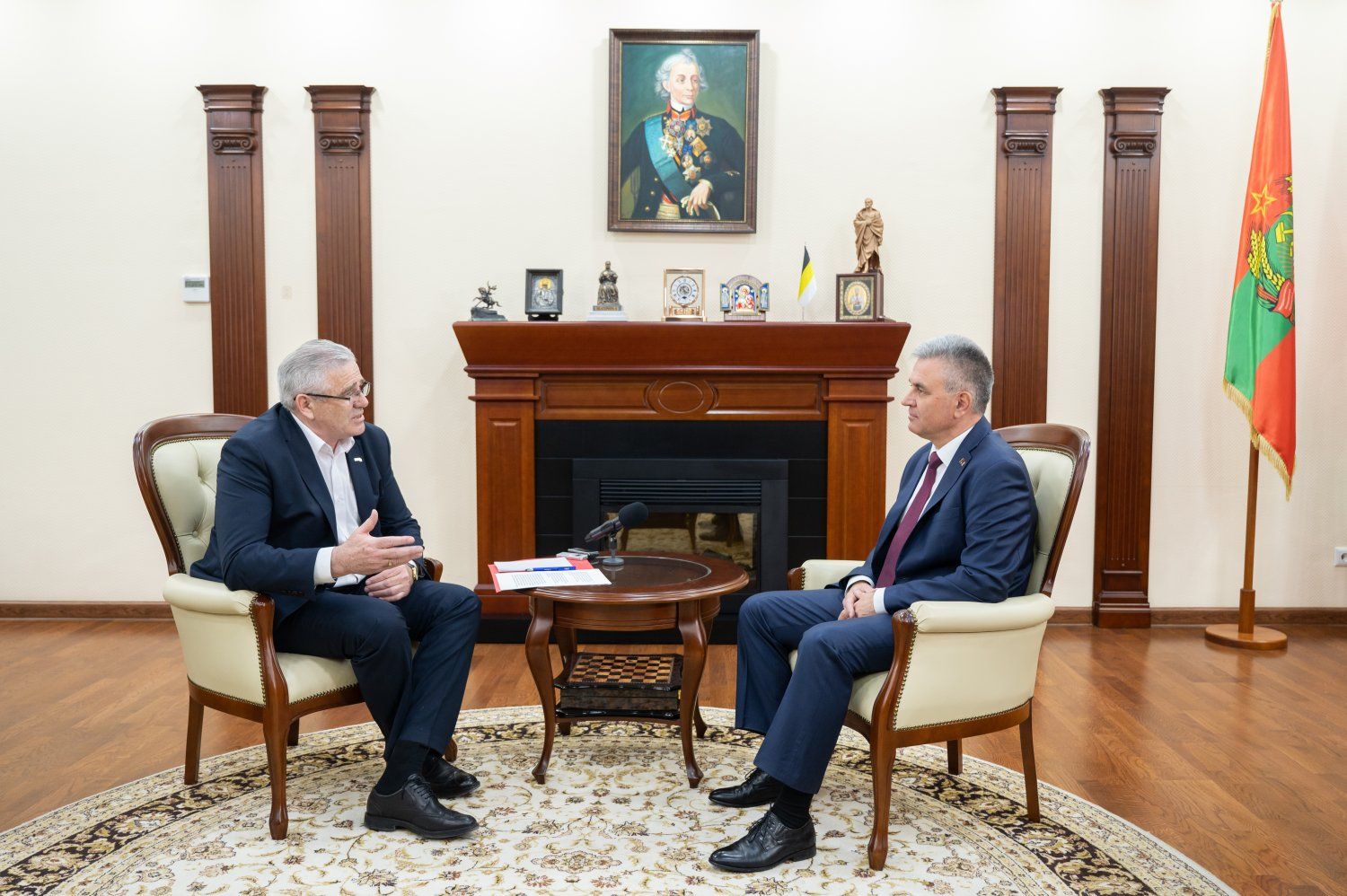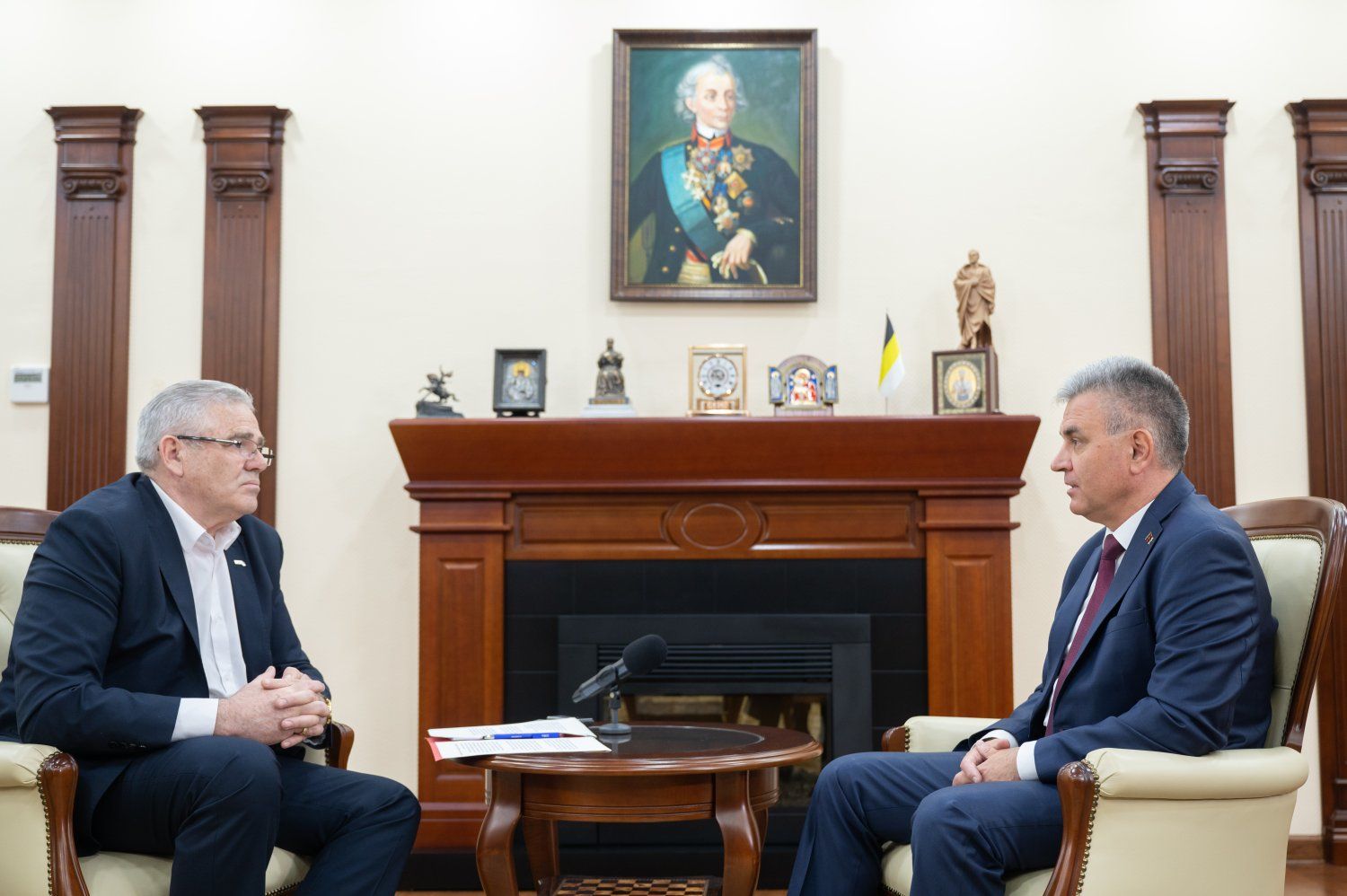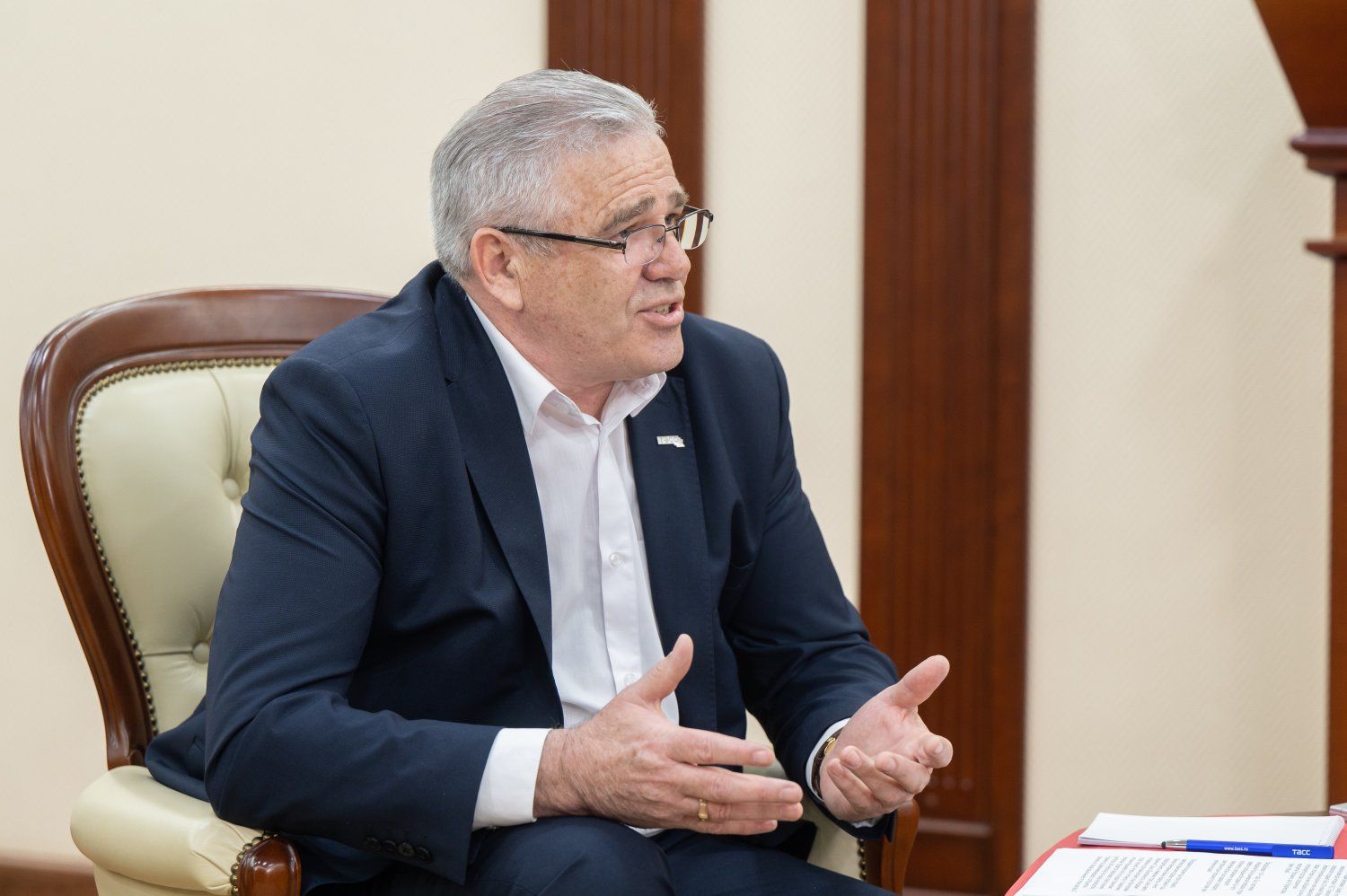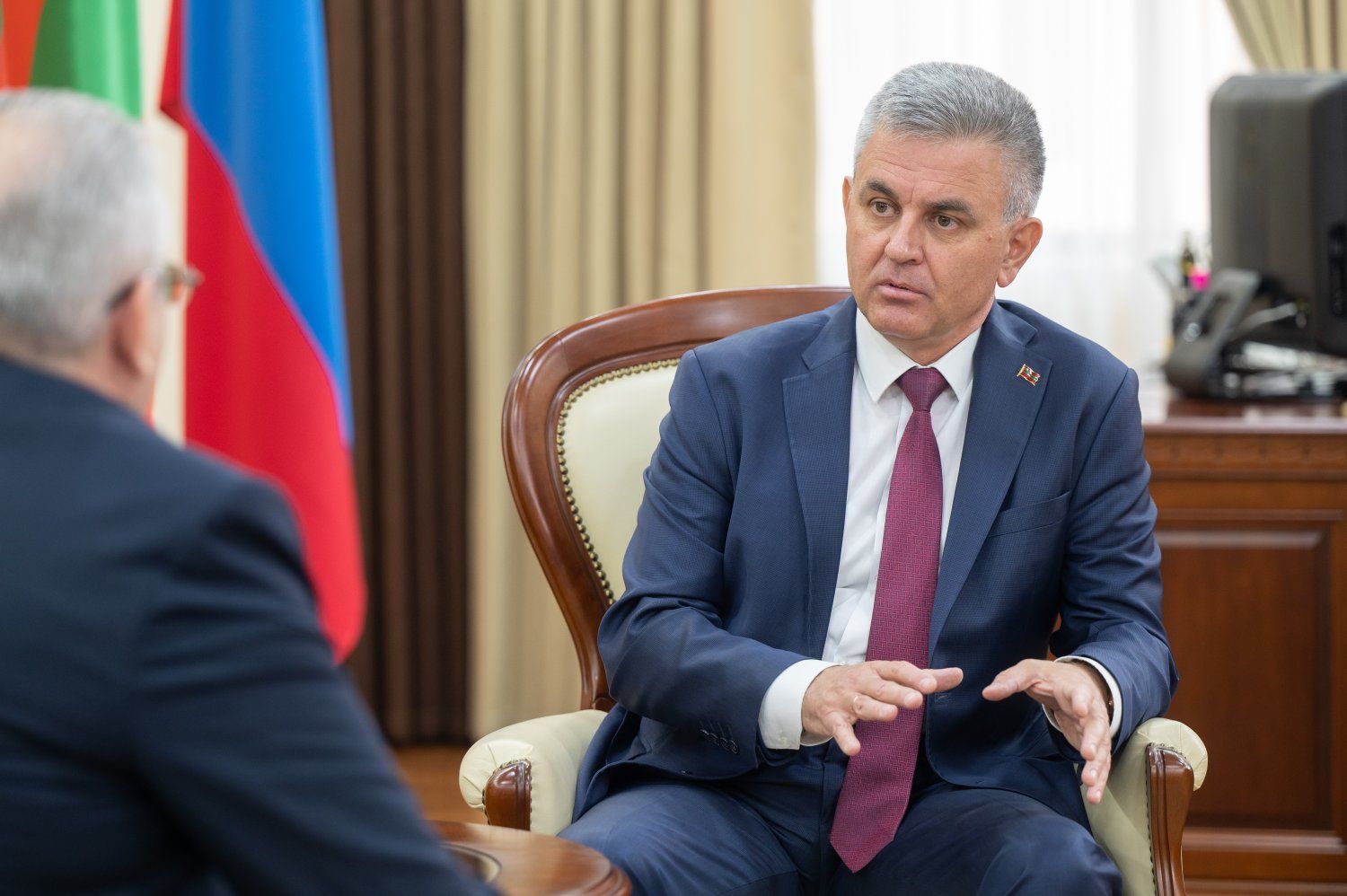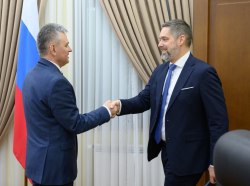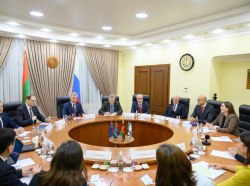- Good afternoon, Vadim Nikolaevich. Thank you for finding time for us. We are talking on the eve of the Great Victory Day. We know that you personally supervise the preparations for this holiday. Of course, my first question will be related to this. Tell us how the anniversary will be celebrated in Pridnestrovie?
- Widely and beautifully – as it should be celebrated the Great Victory Day, with respect for our ancestors. 80 years is a special date, it is an anniversary. Veterans are still alive, thank God. Therefore, we honor the veterans. As for Tiraspol, we have completely renovated the memorial complex in memory of the fallen. Naturally, we will open a museum dedicated to the 80th anniversary of the Victory of the Soviet people in this terrible war.
"The Immortal Regiment" and all other events – dugout, concerts – will definitely be on the program of events.
- Despite the fact that you had a difficult time, pandemic, terrorist threats, you did not hold parades, you decided to hold it now.
- The people are waiting for this. People want it. I have probably received hundreds of requests specifically to hold "The Immortal Regiment" march. This has always been traditional in Pridnestrovie. I have already spoken about this more than once. We did not stop remembering. You know, you can stop remembering, then remember it, then do something again, then again not do something. It is not about us. Our memory does not stop. Our history does not stop. We constantly honor our ancestors. Therefore, this is an exceptional tradition that originated for us, of course, during the Soviet Union and continues to live today.
- Your grandfather fought.
- Of course.
- How many veterans do you have left?
- Unfortunately, we have few veterans left. Here are thirteen people. These are precisely the participants, specifically the participants in the combat operations of the Great Patriotic War. There are people who are equal – Leningrad blockade survivors, home front workers, and so on. But there are few of them. They are leaving. They are already at an advanced age. Nevertheless, some are still cheerful, cheerful in spirit, and cheerful in thoughts. I like talking to them. They talk about their fate. They rarely talk about the war in reality. They talk about life. They love life. It is obvious. They live in the present, yes. As for my grandfather. My grandfather fought in 1944. He took part in the Jassy-Kishinev operation, and a little earlier in other operations. He ended the war in Austria. He returned home, lived like everyone else, worked in the village, on the land. Of course, this is the history of our family. All his brothers fought – three more brothers fought. They all returned from the war. That is another story, a separate story.
– Moldova has begun to erect monuments to Romanian soldiers who died during the Great Patriotic War in recent years. It would seem that there is nothing wrong with this – to honor the fallen. The Moldovan public is increasingly concerned that these people are often presented as heroes. Despite the fact that they fought in the ranks of Hitler's ally, Marshal Antonescu, whose crimes were convicted by the court. These crimes were recently recognized by Bucharest under pressure from the international community. What is your attitude to this?
– The fact that they are erecting a monument to the military, to those who fought on one side or another, I don't really see anything wrong with that. By and large, there are many monuments to the fallen and invaders on the territory of the Russian Federation, including. Memory – it says that there was an enemy here and he died. You can treat this differently and draw different conclusions. Another question is what purpose this is being done for. Either for the purpose of memory, or for the purpose of ideology. Different things. If for the purpose of memory, it is normal. If for the purpose of ideology, namely Nazi-fascist, it is not good. We must fight it. This is my opinion.
– Let's move on to the Pridnestrovian affairs. Pridnestrovie probably experienced the hardest winter in 35 years of independence this year. Your gas supplies have decreased to 3 million cubic meters per day. Are these volumes enough to restore the economy after the winter crisis? Are you working to increase these supplies?
– The year itself has been very unstable in terms of gas supplies. We have switched from the heating season to the summer period now. By and large, we do not need large gas supplies. Even now, we take less than three million, this is enough – both for industry and for people. Thanks to the Russian Federation. We have this gas. The main and guaranteed supplier was still Gazprom, of course. As soon as it left, so to speak, the supply, there are risks in any case. We know them, we work to prevent disruption of supplies, with our Russian colleagues. Everything is fine now. As for industry: there is enough gas for industry. A completely different problem does not concern gas at all. These are the destructive actions of the Republic of Moldova, which block the work of our industrial enterprises. That is the problem. This problem is actually worse than the gas crisis, because this is long-term work, work for the future, to destroy all of our heavy and large industry by and large. That is what they are doing. In what way? Well, the methods are different. This is restricting foreign economic activity, this is closing bank accounts, this is not allowing enterprises to enter the market, this is accusation of some kind of unfair competition, including attempts to introduce some kind of double duties. We have many such enterprises. These are Moldavizolit, Elektromash, Potentsial, and a number of Bendery enterprises in addition to that list, and the Moldovan Metallurgical Plant, and the cement plant. Teams worked there. The teams, of course, are left without work, without earnings. All this is a burden on the budget, including non-payment of taxes, of course. Therefore, this is the main problem. Gas, it may even be secondary in this situation. Restrictive actions on the part of Moldova – they are of primary importance. In addition, double taxation introduced last year, these duties that are taken from our enterprises, also become a burden both on enterprises and on people in the end.
- How did this affect the budget of Pridnestrovie? Was it difficult?
- Negatively, of course.
- You expressed gratitude to Russia in your answer. The most interesting thing is that the other day, during a visit to Kishinev, European Commissioner Kaja Kallas said that Russia had abandoned Pridnestrovie to its fate. By the way, the Moldovan government is also talking about this. Do you agree with this assessment?
- No, of course not. This is an attempt to use energy, gas as an opportunity and assistance in certain interests. I want to remind you of the process, how it began and why it happened. If we talk about the depth of the process: why was this situation even possible? The fault lies, perhaps, not even in the gas, but in the lack of a negotiating platform and exchange of opinions on this issue from Pridnestrovie and Moldova. The “5+2” format does not work for us, we will talk about this later, the “1+1” meetings do not work. I am convinced that if there had been these meetings, there might not have been a gas crisis. In addition, the economic relations between Gazprom and Moldovagaz are also not regulated. All this influenced the adoption of certain decisions by and large. Pridnestrovie was left without gas. Moldova immediately took advantage of this, that's 100%. It is enough to look at that "cheerful hysteria", as it can be called, on the Internet, in the media, when they rejoiced at what was happening in Pridnestrovie. They openly rejoiced in the hope that we would collapse, that things would be really hard for us, and that we would disappear as a state. They were wrong. Because you shouldn't judge by yourself. We are the Pridnestrovian people. Of course, the European Union played a role in resolving the situation here, and the Russian Federation played a role. We are grateful to the European Union for the fact that from February 1 to 10, it was the European Union that gave us assistance in the form of gas, and we were able to stabilize the situation during that period of time – from February 1 to 10. Unfortunately, Moldova began to put forward additional conditions for the supply of European gas after February 10. What conditions? Let's get back to them. What did they mean? This is, firstly, the shutdown of the entire industry and a 10-fold increase in tariffs for our population. Do you understand?
- It is very difficult to understand, because probably any manager would be happy with such support, right? They will be forced to take from them, if these people are left without income after all?
- No, they are not. You see, they can discuss any way they want, but leaving people without work and raising their tariffs tenfold, excuse me, this is simply a mockery of the help itself. This is not how they offer help. Naturally, we were forced to reject this help. Naturally, we worked with the Russian Federation. The Russian Federation, when lending to us, did not put forward any preconditions. It was simply saving the situation, and it saved it. That is why someone says so, but this is probably either due to ignorance of the situation, or due to ignorance of the little things, so to speak, in this whole story. Ultimately, the bottom line is that the Russian Federation lends to us. We buy gas through European, so to speak, platforms, but with the help of Russia.
- You mentioned a very important detail. The lack of a platform for negotiations. Maia Sandu became the first Moldovan president who does not meet with the Pridnestrovian leadership. This is also strange. Although someone wise said that all wars end at the negotiating table, there is no getting away from it. Why is it not possible to resume the negotiation process in your opinion?
- Everything is very simple here, in fact. There is simply an unwillingness on the part of the Moldovan side to sit down at the negotiating table. That's all. Let me remind you that if you take the history of the negotiation process itself, it began after the hostilities in 1992. It took place at first in the form of meetings of senior officials of Moldova and Pridnestrovie, then the "5+2", "3+2" format appeared, and so on. This became such an internationally recognized platform for solving the problems that arise on the left and right banks. It is important that when making decisions, they were supported by protocol decisions of the parties and, most importantly, were implemented into the current legislation – both of Pridnestrovie and Moldova. This was a step exactly towards what we need to go towards in principle – let’s say, when the laws become the same: both on the right and on the left bank. This format was curtailed at the initiative of the Moldovan side in 2019. The final document in Bratislava was not signed. There was an opportunity to re-sign it in November of the same year. The Moldovan side did not agree to this. The “5+2” format was suspended. Then the pandemic. Then the hostilities.
I do not see any desire on the Moldovan side now and probably the European side to resume this format, the “5+2” format. They make references to the difficult relations between Russia and Ukraine. Although, this is incorrect in my opinion. I will explain why. We have a peacekeeping mission here in Pridnestrovie, it is operating. There are mechanisms for a peacekeeping mission. One of the mechanisms is the Joint Control Commission. Representatives of Pridnestrovie, Moldova, the OSCE, Russia and Ukraine meet every Thursday, every week. They sit at the same table, review the same documents and sign them. Do you understand? That is, this is a clear example when Russian and Ukrainian colleagues can be seated at the negotiating table when solving certain problems. Pridnestrovie is a completely different conflict. It has a completely different history. The parties understand this and support peacekeeping here in Pridnestrovie by and large. Therefore, the "5+2" format can be assembled. Moreover, the JCC is made up of military people, and diplomats work in the "5+2" format. What is the problem anyway? All this is artificial. I am convinced that the "5+2" format can be assembled. There is simply no desire, so to speak, to see it and to see Pridnestrovie in it. As for the position of Moldovan President Maia Grigoryevna Sandu, this is her position. I accept it as it is, and there is no desire to discuss it in principle.
- You mentioned the word "diplomacy". The head of the Ministry of Foreign Affairs of Pridnestrovie, Vitaly Ignatiev, says that he is afraid to go to Kishinev. Many Pridnestrovian officials are afraid to go to Kishinev because of these laws "on separatism", that some provocations are possible, some complications are possible. This harms the negotiation process, of course. Tell me, is this problem being discussed with Kishinev? Do they react to what you say, that it is impossible to negotiate like this, when a person can be seized, arrested?
- Kishinev is well aware of all the restrictions. Probably, they know their law "on separatism" very well. They know very well the restrictions that have been introduced at the Kishinev airport. As for Mr. Ignatiev, special restrictions have been imposed on him. Everyone knows this very well. Mr. Ignatiev cannot leave the territory of Pridnestrovie today because of these restrictions. This is done artificially. I will not name the beneficiaries, so to speak, of this plan, but nevertheless they did it so that Ignatiev was pushed away from the negotiation process as much as possible in fact. The main negotiator, the head of the foreign policy department, was pushed away from the negotiation process. Of course, this is a 100% scheme, a 100% algorithm, which actually achieved its goal. Therefore, I propose to lift all restrictions so that Mr. Ignatiev can move freely and be a direct participant in the negotiation process. This is normal.
- There will be parliamentary elections in Moldova in September. There were many residents of Pridnestrovie who traveled, having Russian and Moldovan citizenship, and voted at the previous elections, the presidential ones, last year. But they faced various provocations, I think so. There was the story with the "mining" of the bridge in Rybnitsa, then other such things at the polling stations. Is it possible to open polling stations this year? For example, could this be on the left bank?
- We have special mechanisms for this, we have our own Central Electoral Commission. If there is a request, we will consider it. As for the provocations that took place, in my opinion, they should have been very competently investigated and conclusions should have been drawn, the guilty parties should have been found and, naturally, certain persons should have been punished for these provocations. I don’t know whether this has been done or not. We’ll see what happens, but there is definitely a risk of new provocations during the elections.
- The opposition in Moldova criticizes the authorities for increasing spending on weapons, for the course towards rapprochement with NATO, which they do not hide, despite the fact that neutrality is stipulated in the Constitution of Moldova. Moldovan media report on plans to increase the size of the army and new purchases of weapons. Tell me, does the leadership of Pridnestrovie see a threat in this – in the increase of this potential?
- Well, any neighbor, when another neighbor arms itself and spends more than required on the army, increases the number of personnel, forms some or other special forces, is of course concerned. This concerns not only Pridnestrovie. For example, any neighbor, when someone arms themselves on the border nearby, it always brings nervousness and there are always thoughts "why"? Of course, we monitor what types of weapons Moldova receives, lethal, non-lethal, offensive, defensive, and so on, and draw our own conclusions in this regard. On the other hand, there is also an understanding that when, in fact, there is a war on the border between Russia and Ukraine, very close, of course, a state like Moldova should think about its security, but within acceptable limits. Of course, these joint exercises with NATO, joint Romanian-Moldovan units and so on make us nervous. All this is increasing exponentially. We are monitoring, asking questions, but the Moldovan leadership speaks exclusively about peace: that is, army is army, and in general, the Pridnestrovian problem will be solved exclusively by peaceful means. I hope that they will stick to their opinions. I hope only for a peaceful solution to the Pridnestrovian problem.
- A Ukrainian journalist expressed his opinion recently in an interview with Moldovan Prime Minister Recean, and this opinion is not only his, it has often been expressed by political scientists and politicians in Kyiv, that Kyiv could help Moldova resolve the Pridnestrovian problem by force, and for this purpose, get rid of, so to speak, those armed forces, units that are stationed here on the border. They are afraid. They still call it the 14th Russian Army. Recean answered him that, as you said, Moldova is interested in resolving the Pridnestrovian problem only by peaceful means. In your opinion, does the threat of military intervention from Ukraine exist? Is it real? Or is this more talk? Well, given that you also had a series of terrorist attacks in 2022, there was a long-term, in my opinion, still in effect, terrorist threat regime. Is there such a threat or not?
- I am sure that this journalist is unlikely to take up arms and go somewhere to fight. Do you understand? Pridnestrovie does not threaten anyone – that’s the first thing. And for the last few years (I’m not even talking about 2022 or 2014 or earlier) – Pridnestrovie has never been a source of provocation, a source of aggression or a source of, let’s say, speculation on military issues. Pridnestrovie has never rattled its sabres. In principle, our attitude has not changed since the beginning of 2022 by and large. We are a peace-loving state, we do not threaten anyone. It was against us that terrorist attacks were committed in 2022, and in 2023, and in 2024. It’s not just 2022. The terrorist attacks are quite resonant. If this journalist dig a little deeper these terrorist attacks and named those who ordered these terrorist attacks, one of which was supposed to take place against the OSCE mission, I would have shaken his hand and said a big thank you. But he won’t do that. This is not in the content of his tasks. As for the war here, I have been saying from the very first days that the war in Pridnestrovie is a direct clash between Russia and NATO. I do not doubt it for a second. Everything is very close here. There are interests of both Romania, a NATO member, and the Russian Federation. 220 thousand citizens of the Russian Federation live here. Russian peacekeepers carry out a peacekeeping mission based on an international mandate here. This mandate gives them the right to protect both themselves and the local population, regardless of citizenship. Therefore, those people who talk about a possible provocation, the so-called assistance, so to speak, to Moldova in Pridnestrovie, are in fact pushing Moldova into chaos, into fire and blood. Probably, they should understand this. Maybe this is beneficial to someone today, but I think that it is not beneficial to Moldova at all. Therefore, the Prime Minister, Mr. Recean, correctly said, and I support him, that all issues between Moldova and Pridnestrovie must be resolved exclusively by peaceful means. By peaceful means. We also had a bloody history. We must not return to this chaos.
What is happening on the territory of Ukraine does not make me happy at all. I also spoke about this. This is a war. It will also end at the negotiating table. There is no doubt, in one process or another. What I agree with is that this war cannot end on paper. We must negotiate with people. This is a difficult process. I will be very happy when all this is over.
- Vadim Nikolaevich, but the statements of some Ukrainian journalists and political scientists about the threat from a thousand-strong contingent of Russian troops, peacekeepers, and so on - does this threat really exist?
- Any person who is aware of the peacekeepers who are in Pridnestrovie, understands perfectly well that there are no offensive weapons by and large. How can one attack without offensive weapons? No way. This contingent is intended exclusively for defense and performs precisely these functions. Therefore, all these stories about how we are going to attack somewhere are all pure provocations in fact. Those who are in the headquarters, in the general staffs, including in Ukraine, understand the possibilities, the capabilities. They probably give common sense, not emotions, the opportunity to prove themselves in fact.
- The Gagauz autonomy is currently going through a difficult period of interaction with Kishinev, a conflict one. They complain in Komrat that Kishinev is cutting the powers of the autonomy. Pressure is being exerted on its leadership. You know, they arrest, there are other things, they do not let people leave the country, and so on. The Moldovan opposition claims that the situation in Gagauzia serves as a very bad example for a possible future Pridnestrovian settlement. That is, having looked at this situation, you will think hard about putting yourself in such a position. What is your opinion on this matter?
- Considering all the events that are taking place, I am deeply convinced that the security of Pridnestrovian citizens living here, on this territory, their freedoms, their rights, the right to their language, including, to conduct business activities, and so on, are directly proportional to our independence. Only we can guarantee security – not Kishinev. Kishinev has shown itself in relation to the Gagauz autonomy, it is clear how they act, violating their own Constitution and their laws. Therefore, we are monitoring the processes that are happening around Gagauzia, of course. We do not like it at all. Because we project all these options onto ourselves, onto Pridnestrovie, and once again we are convinced of the correctness of our position, the position of independence of Pridnestrovie.
- Vadim Nikolaevich, thank you very much for the interview. Thank you for taking the time.
- Thank you.

